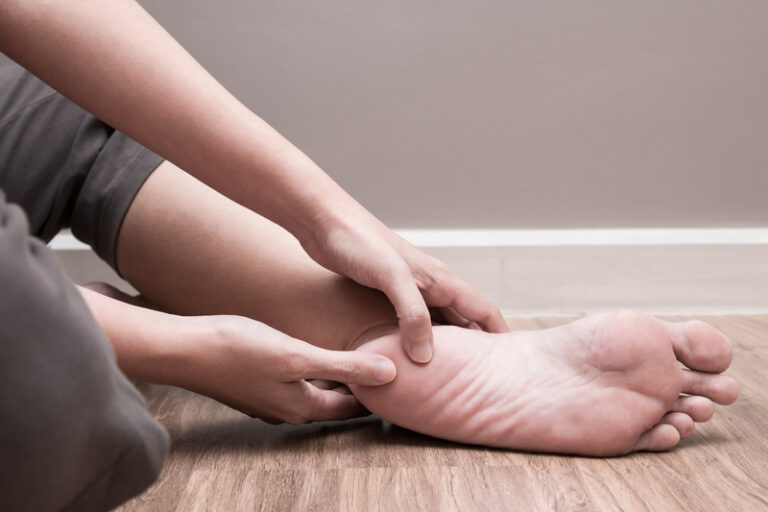If you’ve ever experienced plantar fasciitis, you know that the foot pain it causes can really limit you. As with all other conditions, some people only get it mildly, while others can lose quality of life. It is a common foot condition that causes pain around the heel and sometimes the bottom of the foot. It can be sharp or stabbing, or a dull achiness or burning. It occurs most often when you first arise after sitting for long periods, or arising in the morning. The plantar fascia is a thick band of tissue that runs from your heels to your toes. When it becomes inflamed, it hurts. Poor fitting or poor quality shoes, overuse, poor foot mechanics especially during sports activities, weight, and structural problems can be the cause of this condition.
What can be done? Acupuncture has been shown to be an effective treatment for plantar fasciitis. It works by releasing the endorphins that are the body’s natural pain-relieving chemicals. It helps to reduce inflammation and relaxes the tension in the muscles that are involved. It also supports flexibility of the local tissues, helping improve range of motion. Acupuncture also improves blood flow. This increased blood flow allows more nutrients to flow into the area to speed healing.
That leads to the next important part of healing – nutrition. Without proper nutrition, your body’s ability to heal is reduced or slowed. One of the most important nutrients needed for pliability of the tendon and ligaments are essential fatty acids, particularly omega 3 fatty acids. Essential fatty acids are crucial constituents for your anti-inflammatory and pain hormones. Without them, it is difficult for the body to make them, and, you can’t make something out of nothing! They are also necessary for joint mobility and stability. Since bad knees and hips can alter the biomechanics that influence walking, their health can help the health of your feet. These good fats are also needed for improved healing of damaged tissues.
Helpful nutrients such as real vitamin C (from food, not calcium ascorbate or synthetic ascorbic acid), is essential for collagen synthesis, which is essential for the strength and flexibility of tendons, ligaments and other tissues. Food-based whole vitamin B complexes are important for muscles and tendons and they support healthy nerve function, helping reduce pain. Vitamin D is important for bone health and reducing stress fractures which can occur with plantar fasciitis.
We can’t talk about helpful nutrients without discussing the harmful ones. Processed foods, especially those containing hydrogenated and partially hydrogenated fats, bad cooking oils, caffeine, alcohol, sugar and other consumables that increase inflammation are counter-productive to healing. Lack of hydration can alter the healing mechanism, making recovery take a longer time.
Guidance through the sometimes crazy world of proper supplementation and nutrition for healing, along with acupuncture give you the best chance of recovering from this painful condition.
Want to hear more from Dr. Carling? Check out our podcast. Search for VitalHealth4You on your favorite podcast listening app or go to vitalhealthcda.com/podcasts/
©2024 Holly A. Carling, O.M.D., L.Ac., Ph.D.







